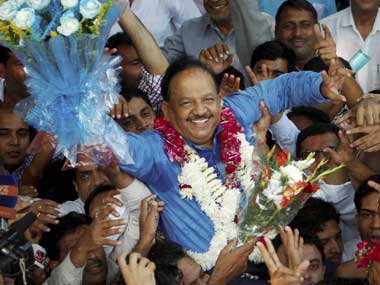By Arun Anand The Bharatiya Janata Party should probably thank its ideological patron - the Rashtriya Swayamsevak Sangh - in Delhi for not bearing the complete brunt of the Aam Aadmi Party (AAP). It was a massive grassroots-level operation in typical RSS style which helped the BJP salvage the situation during the last 10 days of campaigning. In fact, while a number of BJP leaders had been dismissive of the AAP in a fortnight before polls and not taking the threat to the BJP’s bastions seriously enough, the RSS had read the writing on the wall to some extent, though not fully. One of the prime reasons why the RSS worked so actively for BJP was because it had become a prestige issue for the Sangh. Dr Harsh Vardhan was the RSS’s choice. Resistance within the BJP about going to the polls with a CM nominee was vetoed by the RSS as it pushed Harsh Vardhan’s name as the one and the only choice. To ensure that its choice was not proven wrong, the Delhi RSS swung into action as soon as Harsh Vardhan’s name was announced as the BJP’s CM candidate. Thus began a quiet operation in the second week of November. The organisation identified 1,700 “bastis”(habitats) in the city comprising around 4,500 polling booths where it had a strong presence. There are around 12,000 polling booths in Delhi. [caption id=“attachment_1266313” align=“alignleft” width=“380”]  Harsh Vardhan. PTI[/caption] The RSS had set up 1,700 teams to cover each of the polling booths within a span of 10 days. Each team comprised two to three RSS functionaries. These polling booths were spread across Delhi. They were supposed to cover it within a span of 10 days. The teams carried out their “mass contact” programme till 3 December, a day prior to the polls. The members of the teams were carefully selected and comprised local RSS functionaries who knew the area well and the residents too. They provided continuous feedback about the situation at ground zero to their senior functionaries who in turn communicated to the BJP leaders. The mandate of the teams was clear: “Visit every home in the area assigned and urge them to vote for a nationalistic and patriotic party.” It is interesting to note that these teams did not openly ask the people to vote for the BJP. The message was subtly conveyed though. The RSS’s Delhi State “Parachar Pramukh,” Rajiv Tuli, said: “The Sarsanghachalak (RSS chief Mohan Bhagwat) had said this year in his address on Vijayadashami that swayamsevaks should urge the people to come out and vote in large numbers. That is why our swayamsevaks urged the people to come out and vote. We wanted to ensure 100 per cent vote. ” Tuli further added: “We urged the people to vote for a patriotic and nationalistic party and make the right choice.” While visiting these families, the RSS did not distribute any literature. The teams just held informal conversations. They were also able to gauge the general mood, but, as a senior RSS functionary admitted, “We could sense a strong anti-Congress sentiment and an undercurrent for AAP but frankly even we could not gauge the extent of support for AAP.” However, a cautious RSS had activated its network on polling day, especially as reports started coming in during the early hours of polling that AAP was making a strong dent in the BJP’s favourite seats. RSS functionaries across the city ran a parallel network about which even some BJP candidates had no clue. Thus many BJP supporters were brought out from their homes to vote. The RSS can take solace from the fact that it helped the BJP to emerge as the single largest party in Delhi, but the results also indicate that despite the might of the RSS, the BJP has struggled to reach the half-way mark. That could be a cause of worry for not only the BJP but also for the RSS! (Arun Anand is a senior journalist and tracks RSS and BJP)
The RSS in Delhi pulled out all the stops to make Harsh Vardhan the CM, but its efforts underestimated the Aam Aadmi Party wave.
Advertisement
End of Article
Written by FP Archives
see more


)
)
)
)
)
)
)
)
)



